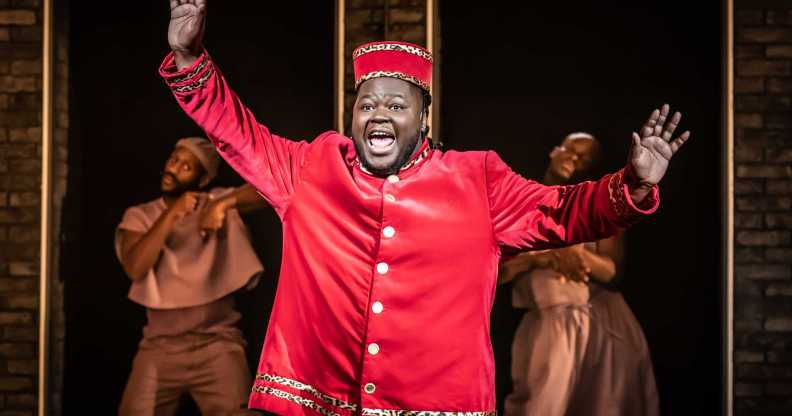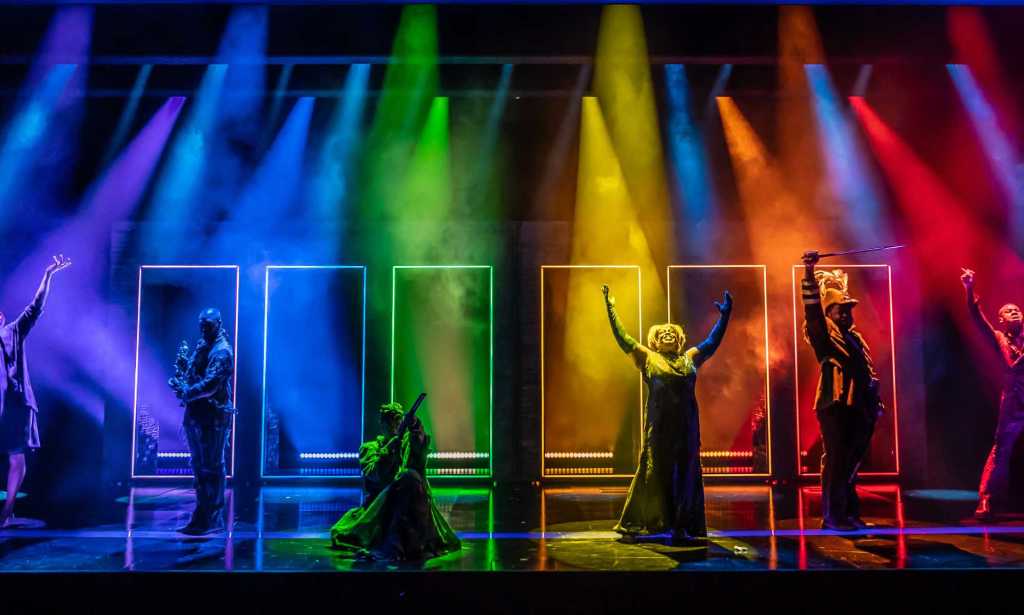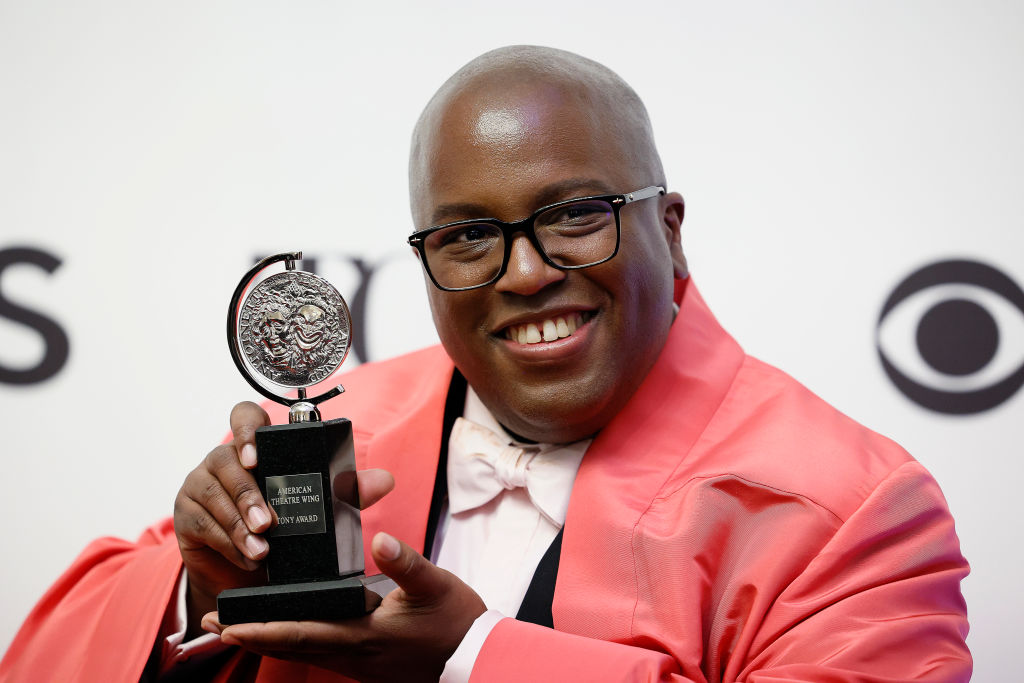A Strange Loop lands in London: ‘I’ve never seen a fat Black gay person be the centre of the story’

Kyle Ramar Freeman as Usher in A Strange Loop. (Marc Brenner)
As the award-winning Broadway musical A Strange Loop arrives in London, PinkNews speaks to lead actor Kyle Ramar Freeman and writer Michael R Jackson about making a “big, Black and queer-a*s great American musical”.
It’s a few weeks into rehearsals for the London production of the hit musical, which tells the story of a fat, gay Black man, who’s writing a musical about a fat, gay Black man.
Underneath London’s Barbican centre, Freeman, transferring from Broadway as lead character, Usher, is surrounded by the six British actors playing his Thoughts – manifestations of his self-hatred.
Words full of hate pour across the room. “Too Black/Your d**k too small,” the Thoughts chorus, as facsimiles of Grindr profiles. The F-slur rings out as Usher grapples with his and other people’s perceptions of him: unwanted, too fat, too Black, not hung enough.
As the cast work through the song, the air in the room is light – there’s laughter and camaraderie. The words may be heavy, but it’s clear this is a safe space to work through internalised demons.
A Strange Loop, which was nominated for every best musical award in New York after its off-Broadway debut in 2019, and later became only the tenth musical to win a Pulitzer Prize (the first off-Broadway, and the first written by a Black person), began life as a monologue by playwright Jackson, who was 23 years old at the time.
“It was meant to be a sort of personal testimony, of what it felt like to a Black gay man, young man, at that time,” he tells PinkNews.
“It was just gonna be that, but the piece kept calling to me in different ways and evolving over time.”
Over the years, Jackson’s monologue evolved into a fully fledged musical script, eventually finding the backing of an all-star cast of executive producers: Jennifer Hudson, Alan Cumming, Ilana Glazer, Mindy Kaling and Billy Porter.
On Broadway, the show, which also bagged two Tony Awards, was marketed as “the big, Black and queer-a*s great American musical”.

Its success felt unprecedented – rarely, if ever, has such an unapologetically queer, Black story been told in such a way. Certainly Freeman, a theatre buff, can’t think of another show like it.
“I have never seen a fat, Black, gay person be the centre of the story and have their thoughts and feelings at the forefront,” he says. “I love that the show does that. And when people, who look like me, come and see it, they can see themselves and that inspires them to write their own musicals, or do their own creative things, or even try to do the show.
“I’m happy about that but it was crazy to experience because I have never been centred. People who look like me are very much the funny person, the person who comes in with the song in the second act.
“That’s the most amazing thing about it, it’s this specific story being centred. And you get to have the whole rainbow of emotions, happy to sad, to frustrated. That’s amazing to do – and watch.”
It sounds difficult to play such an intense and trauma-heavy role night after night.
“It is,” Freeman admits. “And the whole show, Usher’s thoughts, are letting him have it, he’s hearing the worst the whole time.
“As an actor, it’s fun to play, but it does have its challenges. You hear something for so long, eight shows a week, you start to believe it, especially if you relate to a character so much. But I’ve learned to separate myself from Usher. While I relate to him, I am not him.”
Freeman got his big break with A Strange Loop, playing the understudy on Broadway.
In New York, Jackson made the decision to cast the show authentically, with an all queer, Black cast, on the suggestion of director Stephen Brackett.
“I probably would have gotten there eventually. But when he suggested that, it suddenly elevated it into something else,” Jackson says.
It’s difficult to see how any other cast could feel comfortable delivering some of the lines in the script. The argument over whether queer actors should play queer roles is one that will probably never be settled, but, in this case, having a lead who connects so clearly with the character allows for a deep meditation on his experience.
Freeman comes from a Southern Baptist background – like Usher, his family had “reservations” about his gayness.
“They’ve come around,” he says. “But growing up in the Church, hearing what they say about people who are gay – if you’re gay, you’re going to have Aids, all that stuff – we relate in that sense. I don’t have as much self-hatred as Usher may have sometimes, and I don’t let my dark thoughts consume me as much as Usher.”
Freeman was playing Usher when the Broadway production closed. He managed to bring his family to the theatre to see him on stage before that, something he says was difficult, but also a dream come true.
“It was interesting,” he says. “They were very proud that I made it to Broadway and that I was leading a show. It was difficult because some of the things that we discuss [in the show] are things that me and my family have never discussed.
“But that’s what I love about the show and art itself. It allows you to kind of say the things you probably could never say to the people in your life. So, I was giving my best Viola Davis, I was crying from top to bottom. But it was good.”

If you’re thinking the rare nature of the role must create pressure for the star, you’d be wrong.
“My only job is to tell the story,” he says. “If I stay true to telling the story, people will get what they need from the story. If I do my job as an actor, Michael already did his job in crafting the show, if I stick to that and tell Usher’s story, I don’t feel the pressure.”
Jackson agrees: for him, the story isn’t one that should or could represent entire communities.
“There are a lot of people who look at the piece, because it’s so specific about someone who’s Black and gay and fat and all of these things, and they immediately think: ‘Oh, well, that sums up a whole group of people’,” he says.
“I’m not saying that there are not all kinds of intersections, of what Usher’s experiences are or the things he says or the ideas that are espoused through his Thoughts, but there’s not a one-to-one ratio of anything in it.
“It has a lot of different twists and turns internally, because it’s about a person thinking, and coming to conclusions and changing his mind, and being sceptical of the world he lives in, and the world that he lives in being sceptical of him.

“That structure, to me, also means that you can’t just assign one meaning to it. Also, everyone watching it is going to see it in a different way. They’re going to decide what it means to them based on what their own strange loop.
“It’s inherently looping, it can feel like it represents a large group of people at the same time, and it only really represents one person. But when you’re in your body, experiencing something you only experience it through your own lens.”
Audiences are already taking away their own interpretations of the show – previews began this week, and, by all accounts, the show is set to go down a storm.
“I hope they take away that original musicals are still great to do,” he says. “I know we’re in the trend of making movie musicals, which is great, but I hope they appreciate that original musicals are the bee’s knees of theatre.
“I hope they take away that even though they may not understand people’s reality, they can begin to sympathise with other people’s realities and see their perspectives and not be as judgmental.
“I hope they laugh. I hope that they can also look at their own life, and how they talk to themselves. Usher’s thoughts are brutal and wild. So, I hope they can see how they speak to themselves and maybe change that or take a different approach to how they look at themselves.”
A Strange Loop is at the Barbican until 9 September and tickets are now available from ticketmaster.co.uk.
This article contains affiliate links, PinkNews may earn revenue if you click through and purchase products through the links.
How did this story make you feel?

